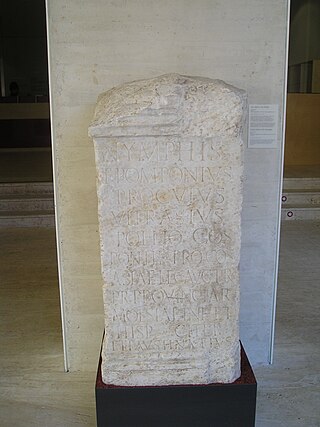Related Research Articles

Titus Pomponius Proculus Vitrasius Pollio was a Roman senator, who held several imperial appointments during the reign of Marcus Aurelius. He was suffect consul in an undetermined nundinium around 151; he was a consul ordinarius in the year 176 with Marcus Flavius Aper as his colleague.
Quintus Pompeius Senecio Sosius Priscus was a Roman senator who was appointed consul during the reign of Marcus Aurelius.
The gens Laberia was a minor plebeian family at ancient Rome. Members of this gens are first mentioned in the second century BC, at which time they held senatorial rank. Most of the members mentioned later were equites, but toward end of the first century AD they attained the consulship, which several of them held throughout the second century.
Gaius Bellicius Flaccus Torquatus was a Roman senator during the reign of Antoninus Pius. He was consul prior in 143 with Herodes Atticus as his colleague. Flaccus Torquatus was the son of Gaius Bellicius Flaccus Torquatus Tebanianus, consul of 124, and the older brother of Gaius Bellicius Calpurnius Torquatus, consul of 148.
Gaius Bellicius Flaccus Torquatus Tebanianus was a Roman senator during the reign of Hadrian. He was consul posterior in 124 with Manius Acilius Glabrio as his colleague.
Gaius Aufidius Victorinus was a Roman senator and general of the second century. A friend of the Emperor Marcus Aurelius and the son-in-law of the advocate and orator Marcus Cornelius Fronto, he was twice consul and governor of several Roman provinces.
Publius Martius Verus was a Roman senator and general. He was twice consul. Verus played a major role in the suppression of the revolt of Avidius Cassius by remaining loyal to the emperor Marcus Aurelius.
Marcus Metilius Aquillius Regulus was a Roman senator of the second century AD. A member of the patrician order, he held the office of consul ordinarius in 157 with another patrician, Marcus Vettulenus Civica Barbarus, as his colleague.
Gaius Calpurnius Flaccus was a Roman senator of the second century. He was attested suffect consul with Lucius Trebius Germanus as his colleague on 15 December of an undetermined year between 122 and 127. Both Flaccus and Germanus are primarily known from inscriptions.
Marcus Gavius Cornelius Cethegus was a Roman senator active during the middle of the second century AD. He was ordinary consul for 170 as the colleague of Gaius Erucius Clarus. Cethegus is best known for his behavior while travelling through Roman Greece, which provoked one person to call him a great fool, to which the philosopher Demonax replied, "Not great".
Quintus Camurius Numisius Junior was a Roman senator active during the later second century AD. He was suffect consul for a nundinium in the first half of the year 161 as the colleague of Marcus Annius Libo.
Tiberius Claudius Julianus was a Roman senator and literary figure who held several offices in the imperial service during the later second century AD. He was suffect consul during the nundinium of September-October 154 with Sextus Calpurnius Agricola as his colleague.
Gaius Javolenus Calvinus was a Roman senator of the 2nd century AD who occupied a number of offices in the imperial service, as well as serving as suffect consul between 140 and 143.
Quintus Cornelius Proculus was a Roman senator, who was active during the middle of the second century AD. He was suffect consul in the nundinium of November–December 146 as the colleague of Lucius Aemilius Longus. Proculus is known entirely from inscriptions.
Gaius Prastina Messalinus was a Roman senator, active during the reign of Antoninus Pius. He was consul in the year 147 with Lucius Annius Largus as his colleague. Messalinus is known entirely from inscriptions.
Lucius Sergius Paullus was a Roman senator, who was active during the reign of Marcus Aurelius. He was twice consul: the first time attested 23 September of an unknown year as suffect consul with [? Lucius Nonius Calpurnius] Torquatus Asprenas as his colleague; and as consul ordinarius for 168 as the colleague of Lucius Venuleius Apronianus Octavius Priscus.
Gaius Julius Bassus was a Roman senator, who was active during the reign of Antoninus Pius. He was suffect consul in the nundinium of November-December 139 as the colleague of Marcus Ceccius Justinus. He was the son of Gaius Julius Quadratus Bassus, consul in 105. The Julii Bassi were a prominent family of Pergamum, that had descended from the Attalid dynasty and Galatian tetrarchs.
Publius Cluvius Maximus Paullinus was a Roman senator, who held a number of imperial appointments during the reigns of Hadrian and Antoninus Pius. He was suffect consul during an undetermined nundinium between 139 and 143. He is known entirely from inscriptions.

Marcus Macrinius Avitus Catonius Vindex was a Roman senator who was active during the reign of Marcus Aurelius. Originally a member of the equestrian order, Vindex demonstrated courage and intelligence that led to his award of dona militaria and elevation into the Senate, followed by his appointment to the consulate, which Géza Alföldy dates to an undetermined nundinium around the year 175.